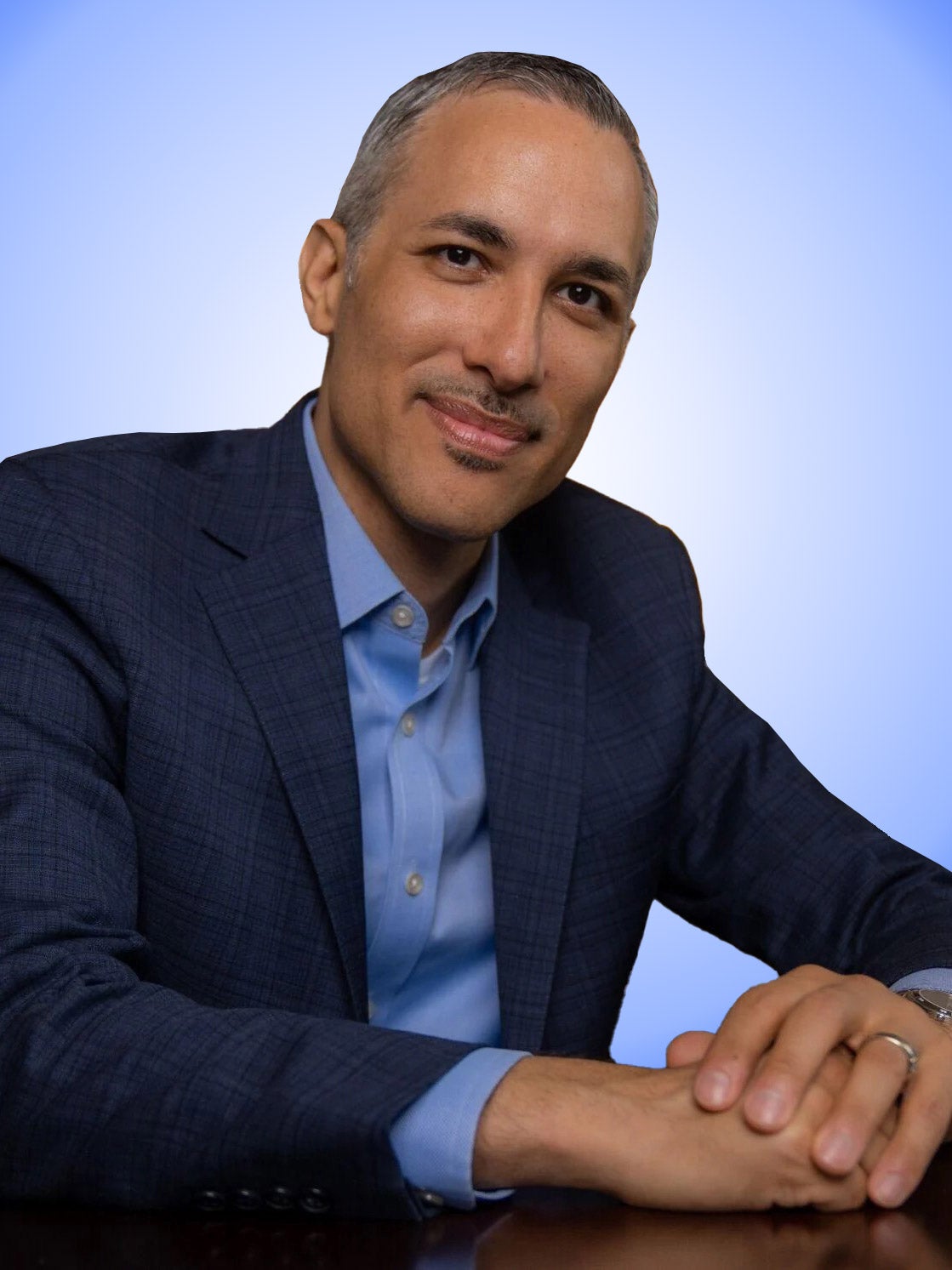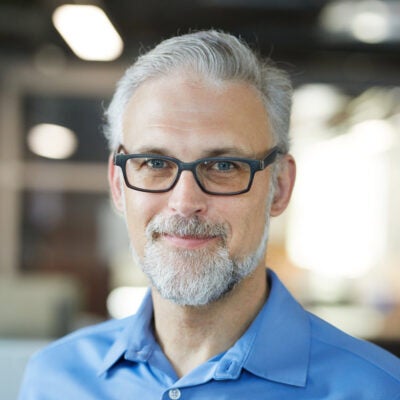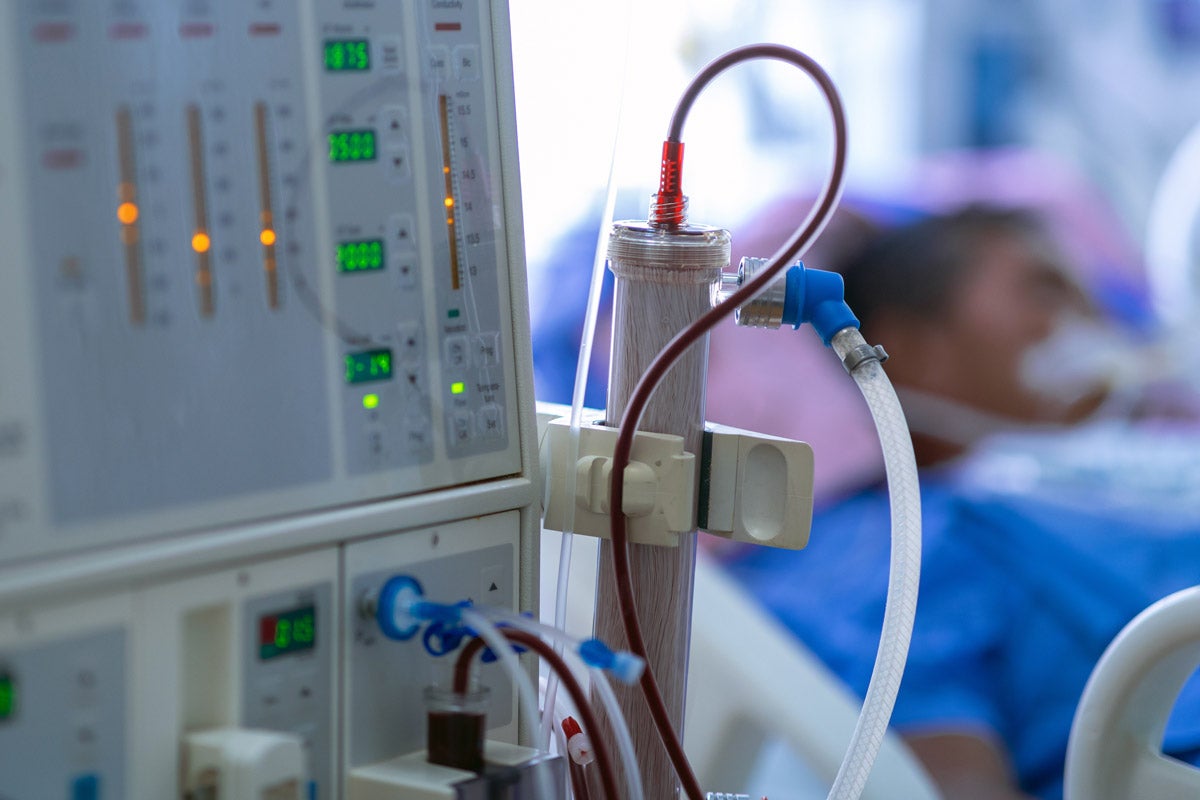
People
Daniel Dawes on why Meharry is adding a school of global health
Daniel Dawes is the founding dean of the School of Global Health at Meharry Medical College, a historically Black university founded in 1876. The new school recently received accreditation for its five inaugural degree programs, which will enroll their first students this fall: master’s and PhD tracks in health equity and health law policy management and a master’s degree in complex health systems leadership. Faculty and students must demonstrate practical applications for their work to get degrees or tenure. Dawes says, “We’re not going to do the traditional publish-or-perish route.”
Dawes comes to Meharry from Morehouse School of Medicine, where he was executive director of the Satcher Health Leadership Institute and led the development of a health equity tracker. He spoke with Michael F. Fitzgerald, Harvard Public Health’s editor in chief.
This interview was edited and condensed.
HPH: What attracted you to this idea of creating a school of public health at a historically Black university?
Dawes: The president of Meharry, James Hildreth, had this grand vision to do something to actually mitigate the impact of COVID-19 on marginalized and vulnerable communities. We were talking, and I said, “This sounds really great. What an incredible idea.” Because I believe we do need a school of global health—not a traditional public health school, but one focused on the actualization, the operationalization, and the optimization of health equity. And he basically said, “Well, do you want the job?”
What we want to do is to fuse public health, health care, business, and law—to bring them together to understand the forces that operate at the highest levels of government [and] in corporate America and beyond. We want to understand their language and their rules. We want to show how multidisciplinary, multisectoral collaboration can work effectively.
I was also motivated by my work for the National Academy of Medicine, which had asked me to conduct a study about the Unequal Treatment report. Even 20 years after that report, there was a dearth of successful interventions to tackle health inequities. Even the successful ones were shown to maybe be effective in one community, but you might not be able to scale it up. So, I thought, “What is it going to take for us to create structural level interventions that go beyond nibbling around the edges of health inequities in America and around the world?” And that got me excited.
A case in point is the start of the Diaspora Human Genome Institute at Meharry. We are collecting genomic information from folks of African descent because less than two percent of the overall genetic information that is studied comes from people of African descent. We want to rectify that to make sure that we are creating a more inclusive health system.
Sign up for Harvard Public Health
Delivered to your inbox weekly.
HPH: Is this in one sense an opportunity to implement the ideas that you lay out in The Political Determinants of Health?
Dawes: Yes. I am really hellbent on making sure that we have created a school where the political determinants of health will be front and center. Our public health students, our medical students, our pharmacists—they need to understand that it is not enough for you to go in and see one patient at a time; you’re sending them back out into the very conditions in which they are living it. That does not help them.
HPH: Is the University of Global Health Equity in Rwanda a model for what you’re doing as you set up the Meharry School of Global Health?
Dawes: They are doing things right. One of their doctoral students contacted me about my book. He wanted a copy but couldn’t get it there. We talked by Zoom. He was from India, a Dalit, the untouchables in the caste system. He wanted to take the model of political determinants and start educating the masses in India, especially from his caste. And I thought, “Wow, this is exactly what I want to see happen.” I want that kind of impact. I want folks who want to change the world to come to Meharry.
HPH: You’re a lawyer by training, which makes you somewhat unique amongst your peers as deans of schools of public health. How different is it to have the frame that you’re bringing to public health?
Dawes: I never thought about it till you just said it. Because I did not have a traditional public health education, my expectations are not influenced by my training. I identified four areas where we believe we can make a significant impact, challenges somebody’s got to address or we’ll never achieve health equity: political determinants of health, mental health, population health, and health communications. That doesn’t mean that we’re not going to be tackling other issues. Responsible AI is going to be infused in all four. Climate change impacts all of these areas. We also want to show our students, you’re learning from the books, but let’s take this now and actualize it. And we’re going to select cities in the United States where we will actualize and do rapid transformation of various health equity initiatives. So stay tuned. That’s going to be coming out.
HPH: In five years or ten years, what’s the goal?
Dawes: In five years, my goal is to see about 300 students admitted into the class. I would love to see us develop what I’m calling the HEROIC pipeline—[through the] Health Equity Research Opportunities and Innovation Center, where we will bring the HBCU community together to advance health equity research in America. I want to open that up to others. Native American leaders have come to me to apply the political determinants of health frame with a Native American lens, so I want to work with them. I’m hoping to have university relationships in Asia and Africa and Central and South America, and the Caribbean as well, perhaps two in each region, where we’re sharing research, data, best practices, and we can work together to create a global health equity tracker and build a global health equity network.
In ten years I hope to read about our graduates in the news, doing amazing things in various countries to advance equity—to make that impact and show the world how it can be done. And I hope they’ll be erasing that pessimism that we see sort of boiling over [right now].
Image: Courtesy of Daniel Dawes

Republish this article
<p>The new school will focus on the practice, not the theory, of health equity.</p>
<p>Written by Michael F. Fitzgerald</p>
<p>This <a rel="canonical" href="https://harvardpublichealth.org/equity/a-qa-with-the-meharry-medical-college-global-health-dean/">article</a> originally appeared in<a href="https://harvardpublichealth.org/">Harvard Public Health magazine</a>. Subscribe to their <a href="https://harvardpublichealth.org/subscribe/">newsletter</a>.</p>
<p class="has-drop-cap">Daniel Dawes is the founding dean of the School of Global Health at Meharry Medical College, a historically Black university founded in 1876. The new school recently received accreditation for its five inaugural degree programs, which will enroll their first students this fall: master’s and PhD tracks in health equity and health law policy management and a master’s degree in complex health systems leadership. Faculty and students must demonstrate practical applications for their work to get degrees or tenure. Dawes says, “We're not going to do the traditional publish-or-perish route.”</p>
<p>Dawes comes to Meharry from Morehouse School of Medicine, where he was executive director of the Satcher Health Leadership Institute and led the development of a <a href="https://healthequitytracker.org/" target="_blank" rel="noreferrer noopener">health equity tracker</a>. He spoke with Michael F. Fitzgerald, <em>Harvard Public Health</em>’s editor in chief.</p>
<p><em>This interview was edited and condensed.</em></p>
<p><strong>HPH:</strong> What attracted you to this idea of creating a school of public health at a historically Black university?</p>
<p><strong>Dawes: </strong>The president of Meharry, James Hildreth, had this grand vision to do something to actually mitigate the impact of COVID-19 on marginalized and vulnerable communities. We were talking, and I said, “This sounds really great. What an incredible idea.” Because I believe we do need a school of global health—not a traditional public health school, but one focused on the actualization, the operationalization, and the optimization of health equity. And he basically said, “Well, do you want the job?”</p>
<p>What we want to do is to fuse public health, health care, business, and law—to bring them together to understand the forces that operate at the highest levels of government [and] in corporate America and beyond. We want to understand their language and their rules. We want to show how multidisciplinary, multisectoral collaboration can work effectively.</p>
<p>I was also motivated by my work for the National Academy of Medicine, which had asked me to conduct a study about <a href="https://harvardpublichealth.org/alumni-post/revisiting-the-unequal-treatment-report-20-years-later/" target="_blank" rel="noreferrer noopener">the Unequal Treatment report</a>. Even 20 years after that report, there was a dearth of successful interventions to tackle health inequities. Even the successful ones were shown to maybe be effective in one community, but you might not be able to scale it up. So, I thought, “What is it going to take for us to create structural level interventions that go beyond nibbling around the edges of health inequities in America and around the world?” And that got me excited.</p>
<p>A case in point is the start of the <a href="https://thedhgi.org/" target="_blank" rel="noreferrer noopener">Diaspora Human Genome Institute</a> at Meharry. We are collecting genomic information from folks of African descent because less than two percent of the overall genetic information that is studied comes from people of African descent. We want to rectify that to make sure that we are creating a more inclusive health system.</p>
<p><strong>HPH: </strong>Is this in one sense an opportunity to implement the ideas that you lay out in <em><a href="https://www.press.jhu.edu/books/title/12075/political-determinants-health">The Political Determinants of Health</a></em>?</p>
<p><strong>Dawes: </strong>Yes. I am really hellbent on making sure that we have created a school where the political determinants of health will be front and center. Our public health students, our medical students, our pharmacists—they need to understand that it is not enough for you to go in and see one patient at a time; you're sending them back out into the very conditions in which they are living it. That does not help them.</p>
<p><strong>HPH:</strong> Is the University of Global Health Equity in Rwanda a model for what you're doing as you set up the Meharry School of Global Health?</p>
<p><strong>Dawes:</strong> They are doing things right. One of their doctoral students contacted me about my book. He wanted a copy but couldn’t get it there. We talked by Zoom. He was from India, a Dalit, the untouchables in the caste system. He wanted to take the model of political determinants and start educating the masses in India, especially from his caste. And I thought, “Wow, this is exactly what I want to see happen.” I want that kind of impact. I want folks who want to change the world to come to Meharry.</p>
<p><strong>HPH: </strong>You're a lawyer by training, which makes you somewhat unique amongst your peers as deans of schools of public health. How different is it to have the frame that you're bringing to public health?</p>
<p><strong>Dawes: </strong>I never thought about it till you just said it. Because I did not have a traditional public health education, my expectations are not influenced by my training. I identified four areas where we believe we can make a significant impact, challenges somebody’s got to address or we’ll never achieve health equity: political determinants of health, mental health, population health, and health communications. That doesn't mean that we're not going to be tackling other issues. Responsible AI is going to be infused in all four. Climate change impacts all of these areas. We also want to show our students, you're learning from the books, but let's take this now and actualize it. And we're going to select cities in the United States where we will actualize and do rapid transformation of various health equity initiatives. So stay tuned. That's going to be coming out.</p>
<p><strong>HPH: </strong>In five years or ten years, what's the goal?</p>
<p><strong>Dawes: </strong>In five years, my goal is to see about 300 students admitted into the class. I would love to see us develop what I'm calling the HEROIC pipeline—[through the] Health Equity Research Opportunities and Innovation Center, where we will bring the HBCU community together to advance health equity research in America. I want to open that up to others. Native American leaders have come to me to apply the political determinants of health frame with a Native American lens, so I want to work with them. I'm hoping to have university relationships in Asia and Africa and Central and South America, and the Caribbean as well, perhaps two in each region, where we’re sharing research, data, best practices, and we can work together to create a global health equity tracker and build a global health equity network.</p>
<p class=" t-has-endmark t-has-endmark">In ten years I hope to read about our graduates in the news, doing amazing things in various countries to advance equity—to make that impact and show the world how it can be done. And I hope they’ll be erasing that pessimism that we see sort of boiling over [right now].</p>
<script async src="https://www.googletagmanager.com/gtag/js?id=G-S1L5BS4DJN"></script>
<script>
window.dataLayer = window.dataLayer || [];
if (typeof gtag !== "function") {function gtag(){dataLayer.push(arguments);}}
gtag('js', new Date());
gtag('config', 'G-S1L5BS4DJN');
</script>
Republishing guidelines
We’re happy to know you’re interested in republishing one of our stories. Please follow the guidelines below, adapted from other sites, primarily ProPublica’s Steal Our Stories guidelines (we didn’t steal all of its republishing guidelines, but we stole a lot of them). We also borrowed from Undark and KFF Health News.
Timeframe: Most stories and opinion pieces on our site can be republished within 90 days of posting. An article is available for republishing if our “Republish” button appears next to the story. We follow the Creative Commons noncommercial no-derivatives license.
When republishing a Harvard Public Health story, please follow these rules and use the required acknowledgments:
- Do not edit our stories, except to reflect changes in time (for instance, “last week” may replace “yesterday”), make style updates (we use serial commas; you may choose not to), and location (we spell out state names; you may choose not to).
- Include the author’s byline.
- Include text at the top of the story that says, “This article was originally published by Harvard Public Health. You must link the words “Harvard Public Health” to the story’s original/canonical URL.
- You must preserve the links in our stories, including our newsletter sign-up language and link.
- You must use our analytics tag: a single pixel and a snippet of HTML code that allows us to monitor our story’s traffic on your site. If you utilize our “Republish” link, the code will be automatically appended at the end of the article. It occupies minimal space and will be enclosed within a standard <script> tag.
- You must set the canonical link to the original Harvard Public Health URL or otherwise ensure that canonical tags are properly implemented to indicate that HPH is the original source of the content. For more information about canonical metadata, click here.
Packaging: Feel free to use our headline and deck or to craft your own headlines, subheads, and other material.
Art: You may republish editorial cartoons and photographs on stories with the “Republish” button. For illustrations or articles without the “Republish” button, please reach out to republishing@hsph.harvard.edu.
Exceptions: Stories that do not include a Republish button are either exclusive to us or governed by another collaborative agreement. Please reach out directly to the author, photographer, illustrator, or other named contributor for permission to reprint work that does not include our Republish button. Please do the same for stories published more than 90 days previously. If you have any questions, contact us at republishing@hsph.harvard.edu.
Translations: If you would like to translate our story into another language, please contact us first at republishing@hsph.harvard.edu.
Ads: It’s okay to put our stories on pages with ads, but not ads specifically sold against our stories. You can’t state or imply that donations to your organization support Harvard Public Health.
Responsibilities and restrictions: You have no rights to sell, license, syndicate, or otherwise represent yourself as the authorized owner of our material to any third parties. This means that you cannot actively publish or submit our work for syndication to third-party platforms or apps like Apple News or Google News. Harvard Public Health recognizes that publishers cannot fully control when certain third parties aggregate or crawl content from publishers’ own sites.
You may not republish our material wholesale or automatically; you need to select stories to be republished individually.
You may not use our work to populate a website designed to improve rankings on search engines or solely to gain revenue from network-based advertisements.
Any website on which our stories appear must include a prominent and effective way to contact the editorial team at the publication.
Social media: If your publication shares republished stories on social media, we welcome a tag. We are @PublicHealthMag on X, Threads, and Instagram, and Harvard Public Health magazine on Facebook and LinkedIn.
Questions: If you have other questions, email us at republishing@hsph.harvard.edu.


